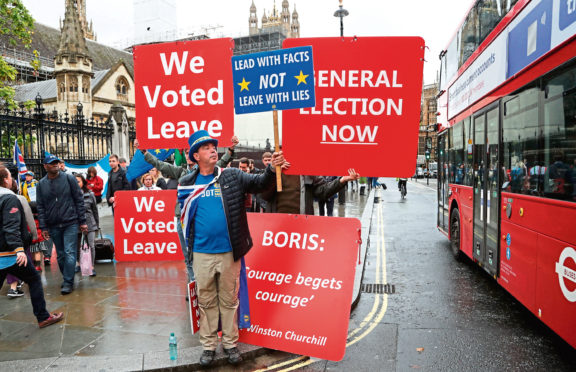Where to start? Where will it all end?
The Supreme Court was created by Tony Blair’s government, as part of the reform of the House of Lords.
No longer would the ultimate legal appeal rest with the second chamber but a new judicial entity. So a force of constitutional modernisation meets Boris Johnson, a force of unconstitutional government.
Regrettably in the short term, Boris may prove the stronger. Incredible as it is, Johnson will not take a judgment that he lied as a cue for resignation. Instead, we have more of this pantomime to come. He did the crime but has no intention of ever doing the time.
It is important to sift through the performance in search of the truth. The court did not block Brexit or offer any opinion on it other than the view that Johnson’s prorogation was a means to avoid parliamentary scrutiny of Brexit.
The judges were not, then, an establishment ruse to promote Remain.
Nor did the court judge on the merits of deal or no deal.
To Boris’s inflammatory “who governs Britain” question the legal answer is clear – the Commons do, so get on with it.
If this exasperates the voters, then it’s hard to fathom why. This is how Britain has been governed for centuries. We do not have a presidential system – we do not elect a leader. Instead we elect the Commons. What’s more, we don’t confuse the parliament with the courts. The “patriots” wailing at the temerity of the judges are no such thing. Their outrage is for a Britain that has never existed, for a democracy that has never functioned.
They pledge allegiance to a place of their own invention and are thus profoundly unpatriotic.
Wishing Britain were different, in the name of British nationalism, is doing Britain great harm.
But like Boris’s disregard for British governance, his supporters dismiss British courts – it makes you wonder if they wouldn’t be happier living somewhere different in the first place.
The Supreme Court ruling was based on an appeal by the UK Government against the Court of Session’s verdict that the prorogation was wrong. This is an endorsement of the Scottish legal system as much as the Supreme Court.
That is always fortuitous.
It is also a huge victory for Joanna Cherry. In shaping the case in the Scottish courts, and thus the legal argument heard by the Supreme Court, she deserves great credit.
As does the leader of the Westminster group of the SNP, Ian Blackford. He and the party have been proved right on this matter. What’s more, the SNP now have the only consistent and coherent Brexit policy of any of the big four parties.
However there is no time for back-slapping. A YouGov poll released yesterday shows 43% think Boris should go. A majority, but not by much – 39% think he should stay.
As ever on this issue, Scotland takes a different view – 55% think the PM should quit, to 25% backing him. The SNP are calling for him to resign, and that seems the right thing to do. Once you start tolerating the idea of leaders who are judged to be liars, then you weaken the state. If there are no rules, there is no point.
However it is the significant support for Johnson which is the most interesting aspect of the poll. This constitutional wrangling is forging a new identity for the PM, as the wronged champion of the people. Bizarrely, the old Etonian is being recast as the new Wat Tyler, who led the 14th Century “peasants’ revolt” in England. It is Boris as the plain man, Boris as the speaker of truth unto power.
This is about the fundamentals of power and identity. A Boris forced out of office is paradoxically a more powerful one. Come the inevitable general election, he is the voice of English nationalism, a concept made real by Brexit delays and court rulings. This is important because in the UK, England rules. A Johnson premiership supported by a popular mandate could prove catastrophic to our parliamentary system, our constitution, the divide between the law and politics.
What is at stake is the future – a Britain not only free of the EU, but free of its own history, a place reinvented to suit the needs of the new elite.
A Great Boris if you like. Triumphalism only plays into his hands.
This is far from over.
